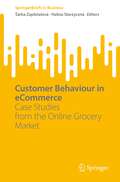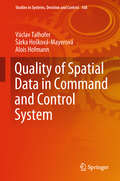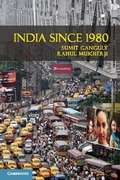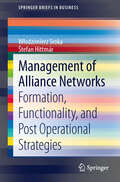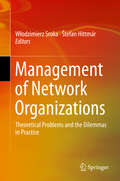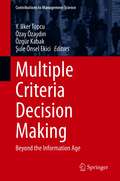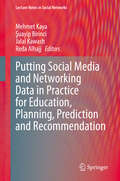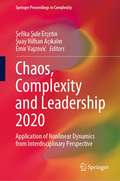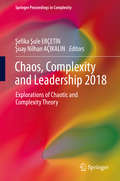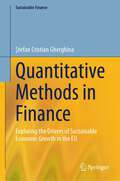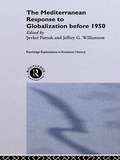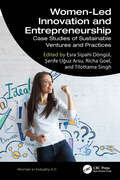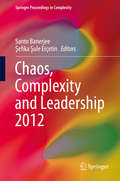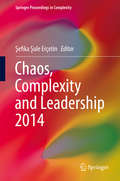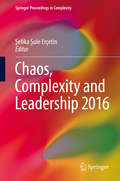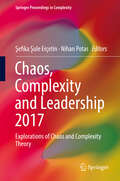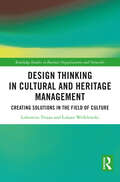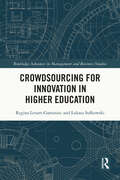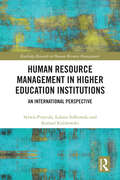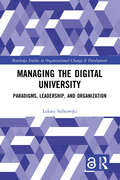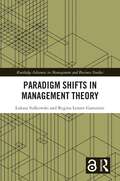- Table View
- List View
Food Consumer Science
by Dominique Barjolle Jasna Milošević Đorđević Žaklina Stojanović Matthew GortonThis book explores the main methods, models, and approaches of food consumer science applied to six countries of the Western Balkans, illustrating each of these methods with concrete case studies. Research conducted between 2008 and 2011 in the course of the FOCUS-BALKANS project forms an excellent database for exploring recent changes and trends in food consumption.
Customer Behaviour in eCommerce: Case Studies from the Online Grocery Market (SpringerBriefs in Business)
by Šárka Zapletalová Halina StarzycznáOnline shopping is undergoing significant changes around the globe, evolving in the food and non-food segments alike. Representing a vital distribution channel that reaches countless customers, sales from online shopping have long-since exceeded USD 1000 billion per year and are growing steadily. This book is intended for general readers and professionals interested in companies’ strategic orientation in connection with their online format and building and strengthening customer loyalty. In this regard, their business strategies are not considered in their full scope and complexity; instead, the book focuses more narrowly on the relationship between business strategy, buying behavior and customer loyalty.
Quality of Spatial Data in Command and Control System (Studies in Systems, Decision and Control #168)
by Šárka Hošková-Mayerová Václav Talhofer Alois HofmannThis monograph aims to familiarize readers with the problem of evaluating the quality and reliability of digital geographic information in terms of their use. It identifies the key requirements for the functionality of this information and describes the system of evaluating its quality and reliability. The whole text is supplemented by examples that document the impact of different quality of the information on the entire decision-making process in command and control systems at the rescue and military levels.The monograph is primarily intended for professionals who are responsible for the implementation of digital geographic information in command and control systems, or for those who use them in their work. For this reason, particular attention is paid especially to the user aspects of the digital geographic information used.Václav Talhofer is Full Professor of Cartography and Geoinformatics at the University of Defense in Brno, Czech Republic.Šárka Hošková-Mayerová is Associate Professor of Mathematics at the University of Defense in Brno, Czech Republic.Alois Hofmann is a teacher and scientist of Cartography and Geoinformatics at the University of Defense in Brno, Czech Republic.All authors contributing to this book have been extensively studying the methods and procedures for the use of digital geographic information, especially in the environment of the Czech Armed Forces.
India Since 1980
by Rahul Mukherji Šumit GangulyThis book considers the remarkable transformations that have taken place in India since 1980, a period that began with the assassination of the formidable Prime Minister Indira Gandhi. Her death, and that of her son Rajiv seven years later, marked the end of the Nehru-Gandhi era. Although the country remains one of the few democracies in the developing world, many of the policies instigated by these earlier regimes have been swept away to make room for dramatic alterations in the political, economic and social landscape. Sumit Ganguly and Rahul Mukherji, two leading political scientists of South Asia, chart these developments with particular reference to social and political mobilization, the rise of the BJP and its challenge to Nehruvian secularism and the changes to foreign policy that, in combination with its meteoric economic development, have ensured India a significant place on the world stage.
Management of Alliance Networks
by Włodzimierz Sroka Štefan HittmárEffective management is crucial to the success of the inter-firm cooperation, and may reduce the risk that is inherently associated with these strategies. If cooperative strategy is to be successful, managers must have knowledge of factors that should be taken into consideration during formation and management of alliance networks. Therefore the main goal of this book is an understandable and simple presentation of the complexity involved in the management of alliance networks at three basic stages: formation stage, functioning stage, and post-operational stage. The book consists of six chapters, both theoretical and practical. A new model for management of alliance networks, which utilizes different instruments and tools, has been developed in the work. The last part of the book concentrates on the management of alliance networks in a practice-based framework based on the example of an engineering company which has formed a portfolio of bilateral alliances.
Management of Network Organizations
by Włodzimierz Sroka Štefan HittmárEffective management is crucial to the success of network organizations and can reduce the risk inherently associated with cooperative strategy. This contributed volume addresses the management of network organizations from both theoretical and practical perspectives, as well as an international standpoint in the form of selected cases from various Central European countries. The authors claim that without some type of network management, irrespective of the type of network, it is impossible to effectively compete with other companies and/or networks. As network organizations are representative of a broad range of possible network types, i. e. alliance networks, clusters, outsourcing, and virtual organizations, this book presents various perspectives on the management of network organizations. The book features articles from different scholars who have practical experience in network organizations, written in simple and easy-to-follow language, with a wide application of practical cases. Given its successful combination of theory and practice, together with the nature of the texts presented, the book offers a valuable resource for a broad readership, including scholars, managers and management science students.
Pandemics: Insurance and Social Protection (Springer Actuarial)
by María del Carmen Boado-Penas Julia Eisenberg Şule ŞahinThis open access book collects expert contributions on actuarial modelling and related topics, from machine learning to legal aspects, and reflects on possible insurance designs during an epidemic/pandemic.Starting by considering the impulse given by COVID-19 to the insurance industry and to actuarial research, the text covers compartment models, mortality changes during a pandemic, risk-sharing in the presence of low probability events, group testing, compositional data analysis for detecting data inconsistencies, behaviouristic aspects in fighting a pandemic, and insurers’ legal problems, amongst others.Concluding with an essay by a practicing actuary on the applicability of the methods proposed, this interdisciplinary book is aimed at actuaries as well as readers with a background in mathematics, economics, statistics, finance, epidemiology, or sociology.
Multiple Criteria Decision Making: Beyond the Information Age (Contributions to Management Science)
by Özgür Kabak Y. Ilker Topcu Özay Özaydın Şule Önsel EkiciData and its processed state 'information' have become an indispensable resource for virtually all aspects of business, education, etc. Consequently, decisions regarding the handling of this data, transforming it into meaningful information, and ultimately arriving at the best course of action have taken on a new importance. This book highlights a selection of cutting-edge research on decision making presented at the 25th International Conference on Multiple Criteria Decision Making (MCDM 2019), held in Istanbul, Turkey.
New Perspectives in Operations Research and Management Science: Essays in Honor of Fusun Ulengin (International Series in Operations Research & Management Science #326)
by Özgür Kabak Y. Ilker Topcu Emel Aktas Özay Özaydın Şule Önsel EkiciThis book presents innovative operations research applications in business, specifically industrial engineering and its sub-disciplines. It investigates new perspectives in operations research and management science with regard to research methods, the research context, and industrial engineering, offering readers a broad range of new approaches to management problems. The book features the latest work of researchers who have worked with Professor Fusun Ulengin or built upon her work in their academic careers. Written in honor of Prof. Ulengin, this book was edited by her former Ph.D. students, who are now experts in operations research, multiple criteria decision making, competitiveness, logistics, and supply chain management. Prof. Ulengin’s impact in academia is visible in the range of topics and methodologies featured in this book: Location and transportation problems, competitiveness of nations, food supply chains, debt collection, mathematical modelling, multiple criteria decision making, data envelopment analysis, random forests, and Bayesian networks.
Putting Social Media and Networking Data in Practice for Education, Planning, Prediction and Recommendation (Lecture Notes in Social Networks)
by Jalal Kawash Reda Alhajj Mehmet Kaya Şuayip BirinciThis book focusses on recommendation, behavior, and anomaly, among of social media analysis. First, recommendation is vital for a variety of applications to narrow down the search space and to better guide people towards educated and personalized alternatives. In this context, the book covers supporting students, food venue, friend and paper recommendation to demonstrate the power of social media data analysis. Secondly, this book treats behavior analysis and understanding as important for a variety of applications, including inspiring behavior from discussion platforms, determining user choices, detecting following patterns, crowd behavior modeling for emergency evacuation, tracking community structure, etc. Third, fraud and anomaly detection have been well tackled based on social media analysis. This has is illustrated in this book by identifying anomalous nodes in a network, chasing undetected fraud processes, discovering hidden knowledge, detecting clickbait, etc. With this wide coverage, the book forms a good source for practitioners and researchers, including instructors and students.
Chaos, Complexity and Leadership 2020: Application of Nonlinear Dynamics from Interdisciplinary Perspective (Springer Proceedings in Complexity)
by Şefika Şule Erçetin Şuay Nilhan Açıkalın Emir VajzovićThis book analyzes a range of new developments in various fields concerning the concepts of chaos and complexity theory. The proceedings of the 7th International Symposium on Chaos, Complexity and Leadership feature newly developed concepts involving various research methodologies for identifying chaos and complexity in different fields of the sciences and leadership. In addition, it explores chaotic and complex systems from all fields of knowledge in order to stake a claim of prevalence of compatibility between knowledge fields. Particular emphasis is placed on exploring non-linearity in order to open a discussion on new approaches to and perspectives on chaos, complexity and leadership. Readers will find coverage of important events that have recently taken place in our world, regardless of whether they were social, political, economic or scientific in nature. The book explores diverse aspects of and issues related to the effects of chaos and complexity in the world; discusses the application of nonlinear dynamics in order to arrive at transformational policies; and offers projections of tomorrow’s world using an interdisciplinary approach. Though primarily intended for readers with an interest in nonlinear science, thanks to its focus on the application of chaos and complexity to other disciplines, the book appeals to a broad readership.
Chaos, Complexity and Leadership 2018: Explorations of Chaotic and Complexity Theory (Springer Proceedings in Complexity)
by Şefika Şule Erçeti̇n Şuay Nilhan AçikalinThis book constitutes the proceedings of the 6th International Symposium on Chaos, Complexity and Leadership (ICCLS). Written by interdisciplinary researchers and students from the fields of mathematics, physics, education, economics, political science, statistics, the management sciences and social sciences, the peer-reviewed contributions explore chaotic and complex systems, as well as chaos and complexity theory in the context of their applicability to management and leadership. The book discusses current topics, such as complexity leadership in the healthcare fields and tourism industry, conflict management and organization intelligence, and presents practical applications of theoretical concepts, making it a valuable resource for managers and leaders.
Quantitative Methods in Finance: Exploring the Drivers of Sustainable Economic Growth in the EU (Sustainable Finance)
by Ştefan Cristian GherghinaThis book explores certain social and environmental drivers of sustainable economic growth for European Union countries (EU-27) and United Kingdom (UK) in the context of the UN 2030 Agenda for Sustainable Development. The author provides a comprehensive overview of the factors that impact and facilitate sustainable economic growth and discusses the complex set of factors involved in sustainable economic development. Special attention is given to quantitative frameworks and empirical modelling, with the main focus on panel data regression models and vector error correction model approach. Furthermore, the book develops ratings of sustainable economic growth for each of the explored countries, by employing data mining techniques such as principal component analysis. Also, the data envelopment analysis non-parametric methodology towards assessing sustainable economic growth is investigated, as well as the cluster analysis in order to classify the selected nations according to sustainable economic growth. The book appeals to policy-makers and academics targeting to learn more about the characteristics of sustainable economic growth.
The Mediterranean Response to Globalization before 1950 (Routledge Explorations In Economic History Ser. #Vol. 18)
by Jeffrey G. Williamson Şevket PamukThe studies in this exceptional volume explore the challenges and opportunities presented by globalization events prior to 1950, and identify how countries around the Mediterranean responded to them. In addition to comparative assessments of regional performance, the volume offers detailed case studies of Spain, Italy, the Balkans, Turkey, Israel a
Women-Led Innovation and Entrepreneurship: Case Studies of Sustainable Ventures and Practices (Women in Industry 4.0)
by Richa Goel Tilottama Singh Esra Sipahi Döngül Şerife Uğuz ArsuThere is a glaring lack of recognition for the contributions of women to innovation, entrepreneurship, and sustainable development in literature. This book seeks to address this gap by highlighting the often-overlooked accomplishments of women in these crucial fields.Women- Led Innovation and Entrepreneurship: Case Studies of Sustainable Ventures and Practices features interviews with industry thought leaders and experts, providing exclusive insights into the changing role of women in driving sustainable development through innovation. The book offers a range of resources, including checklists and tools, designed to foster a supportive environment and offer practical advice and strategies for aspiring entrepreneurs and innovators. It outlines actionable steps for implementing sustainable practices and provides valuable insights that can be applied in the real world. Furthermore, this book presents in-depth case studies of women from various industries and regions, showcasing their innovative ventures, strategies, and how they have overcome obstacles to achieve success in entrepreneurship while promoting sustainability.It serves as a valuable reference for academics, policymakers, and professionals interested in exploring the intersection of gender, innovation, entrepreneurship, and sustainable development.
Chaos, Complexity and Leadership 2013 (Springer Proceedings in Complexity)
by Santo Banerjee Şefika Şule ErçetinThese proceedings from the 2013 symposium on "Chaos, complexity and leadership" reflect current research results from all branches of Chaos, Complex Systems and their applications in Management. Included are the diverse results in the fields of applied nonlinear methods, modeling of data and simulations, as well as theoretical achievements of Chaos and Complex Systems. Also highlighted are Leadership and Management applications of Chaos and Complexity Theory.
Chaos, Complexity and Leadership 2014 (Springer Proceedings in Complexity)
by Şefika Şule ErçetinThis work represents the third entry of the series of works on "Chaos, Complexity and Leadership". Contents of the book are composed from broad range of chaos, complexity and their applications in multi disciplines. Articles reflect different perspectives in the field of applied nonlinear methods, modeling of data and simulations as well as theoretical achievements of chaos and complex systems. In addition to this, readers are going to find new applications in leadership and management of chaos and complexity theory such as in fields from education to politics. It is completely new and fresh piece of mind for readers who are interested in chaos, complexity and especially leadership.
Chaos, Complexity and Leadership 2016
by Şefika Şule ErçetinThis book covers the proceedings from the 2016 International Symposium on Chaos, Complexity and Leadership, and reflects current research results of chaos and complexity studies and their applications in various fields. Included are research papers in the fields of applied nonlinear methods, modeling of data and simulations, as well as theoretical achievements of chaos and complex systems. Also discussed are leadership and management applications of chaos and complexity theory.
Chaos, Complexity and Leadership 2017: Explorations Of Chaos And Complexity Theory (Springer Proceedings in Complexity)
by Şefika Şule Erçetin Nihan PotasThe proceedings of the 2017 Symposium on Chaos, Complexity and Leadership illuminate current research results and academic work from the fields of physics, mathematics, education, economics, as well as management and social sciences. The text explores chaotic and complex systems, as well as chaos and complexity theory in view of their applicability to management and leadership.This proceedings explores non-linearity as well as data-modelling and simulation in order to uncover new approaches and perspectives. Effort will not be spared in bringing theory into practice while exploring leadership and management-laden concepts. This book will cover the analysis of different chaotic developments from different fields within the concepts of chaos and complexity theory. Researchers and students in the field will find answers to questions surrounding these intertwined and compelling fields.
European Cities in Dynamic Competition: Theory and Case Studies on Urban Governance, Strategy, Cooperation and Competitiveness
by Horst Albach Heribert Meffert Andreas Pinkwart Ralf Reichwald Łukasz ŚwiątczakWorld population and the number of city dwellers are steadily growing. Globalization and digitalization lead to an increased competition for skilled and creative labor and other economic resources. This is true not only for firms, but increasingly also for cities. The book elaborates on resulting challenges and opportunities for urban management from the European perspective, and discusses theories, methods and tools from business economics to cope with them. Contributions in this volume come from scholars and practitioners of economics, business administration and urban management, and cover aspects ranging from urban dynamics to city marketing. They draw on experiences from several European cities and regions, and discuss strategies to improve city performance including Open Government, Smart City, cooperation and innovation. The book project was initiated and carried out by the Center for Advanced Studies in Management (CASiM), the interdisciplinary research center of HHL Leipzig Graduate School of Management. It is addressed to scholars and managers in Europe and beyond, who will benefit from the scientific rigor and useful practical insights of the book.
Design Thinking in Cultural and Heritage Management: Creating Solutions in the Field of Culture (ISSN)
by Lubomira Trojan Łukasz WróblewskiThe ability to discover and respond to societal needs in the field of culture requires an integrated, interdisciplinary, and cross-sectoral approach. Such a holistic view is offered by the design thinking method, which has been extracted from the field of design and could be applied also in the sphere of culture. Interdisciplinarity and consideration of users' needs are characteristics of contemporary design and can be a significant support when faced with the challenges of cultural heritage management. The abovementioned factors act as the premise behind undertaking an analysis of the possibility of adapting the design thinking method to the management of intangible cultural heritage, and to develop a model of the design thinking process for this area. This research volume is the first comprehensive study of the application of the design thinking method to cultural management, especially management of the intangible cultural heritage. It asserts that design thinking can bring numerous benefits to organizations involved in the management of intangible cultural heritage and to its depositories. It will be of interest to researchers and academics in the fields of public and nonprofit management, strategic management, and value creation in the field of culture; students of design for culture and heritage; and practitioners in cultural management.
Crowdsourcing for Innovation in Higher Education (Routledge Advances in Management and Business Studies)
by Łukasz Sułkowski Regina Lenart-GansiniecSignificant disruption to the educational sector occurred due to the COVID-19 pandemic. This shed a light on the need for new delivery methods and greater collaboration, which has become urgent and obvious as existing structures and traditional channels have struggled to cope or shut down. Higher education institutions often fail to crowdsource successfully because crowds differ in how they are organized compared to traditional sourcing. Instead of managing, higher education institutions work with external contributors who self-select into the process. Crowdsourcing has significant potential to transform the education space by enhancing existing methodologies and offering innovative possibilities to develop new pedagogical techniques. This offers benefits for practitioners, institutions, students and participants. Drawing on theory and best practice, illustrated with a wide range of the examples and cases, Crowdsourcing for Innovation in Higher Education offers invaluable guidance and will be of interest to researchers, academics, policymakers, and students in the fields of higher education, development studies, organizational studies, management science, and knowledge management.
Human Resource Management in Higher Education Institutions: An International Perspective (Routledge Research in Human Resource Management)
by Łukasz Sułkowski Sylwia Przytuła Konrad KulikowskiIn an era marked by increasing globalization, international competition, digitalization, and social and cultural changes, higher education institutions (HEIs) play a pivotal role in establishing the knowledge-based economy of each country, which is perceived as its soft power. The need to explore and highlight the specificity of human resource management (HRM) practices in higher education institutions has become urgent and evident. This book provides new theoretical and practical insights into HRM in HEIs. A profound analysis of the global literature clearly exposes that human resource practices are often applied in academia as single solutions rather than as a systematic approach to planning, attracting, motivating, developing, and retaining scientists. The global trends in academia, such as the need for branding and positioning in higher education ranking systems, growing retention and brain circulation between academia and business, diversity in academia, and the digitalization of teaching, have resulted in challenges such as de-recruitment, academic burnout and ill-being, and technostress, which are also addressed in this book.
Managing the Digital University: Paradigms, Leadership, and Organization (Routledge Open Business and Economics)
by Łukasz SułkowskiThe reflection on university management is based on the question about the shape of universities of the future. Civic, responsible, sustainable, virtual, digital, and many other universities can be mentioned among the concepts present in the literature. All these names describe an important distinctive feature of a university, which will gain more and more importance in the future. However, given the fundamental importance of the radical change taking place, it seems that the most appropriate name, reflecting the essence of the emerging new formation, is "digital university." This is because of the importance of digital transformation, which has been developing for several decades, bringing deep and multidirectional changes in the areas of technology, economy, society, and culture. It is a disruptive civilizational transition and, although stretched over many decades, it is revolutionary in nature, significantly changing our lives in the Anthropocene. The book has three cognitive and pragmatic objectives: to provide a new perspective on the changing academic organization and management; to reflect on higher education management concepts and methods; and to present an overview of university management, governance, and leadership, useful from the perspective of academic managers, and other stakeholders. The Open Access version of this book, available at www.taylorfrancis. com, has been made available under a Creative Commons Attribution-Non Commercial-No Derivatives 4.0 license.
Paradigm Shifts in Management Theory (Routledge Advances in Management and Business Studies)
by Łukasz Sułkowski Regina Lenart-GansiniecParadigm Shifts in Management Theory is an illuminating exploration of the evolving landscape of management science. This book goes beyond the surface, delving into profound insights and perspectives that redefine traditional paradigms.Through rigorous analysis and reflective narratives, each chapter unveils the transformative shifts shaping organizational leadership, offering a comprehensive understanding of key concepts and methodologies. From classical principles to emerging paradigms, elucidating the future of organizational leadership, readers will gain invaluable insights through empirical evidence and theoretical explorations, fostering a nuanced comprehension of practical applications. Advanced students, researchers, and practitioners will find that this book equips readers with essential knowledge to navigate the complexities of modern management science, fostering critical thinking and innovative approaches in real-world scenarios. Practitioners in organizational leadership benefit from practical insights and innovative perspectives, enhancing strategic decision-making and competitive advantage. Additionally, policymakers and interdisciplinary scholars exploring social phenomena find value in the interdisciplinary exchange facilitated by paradigm shifts. Embracing these shifts is crucial for advancing management science, ensuring its relevance and effectiveness in addressing contemporary challenges.Catering to a diverse audience within academia and professional settings, it serves students and researchers in management studies, offering a robust foundation in theoretical frameworks and research methodologies.

